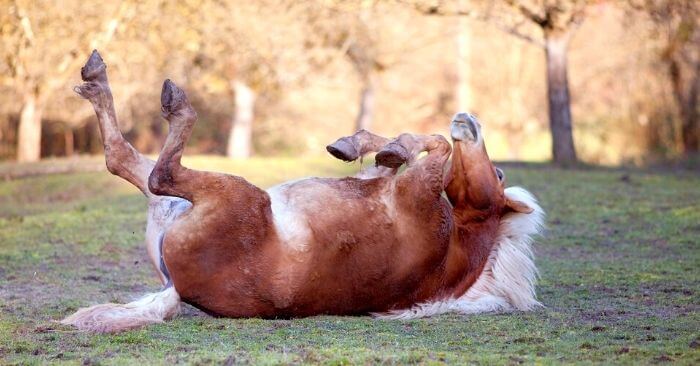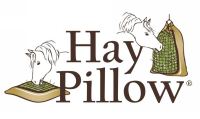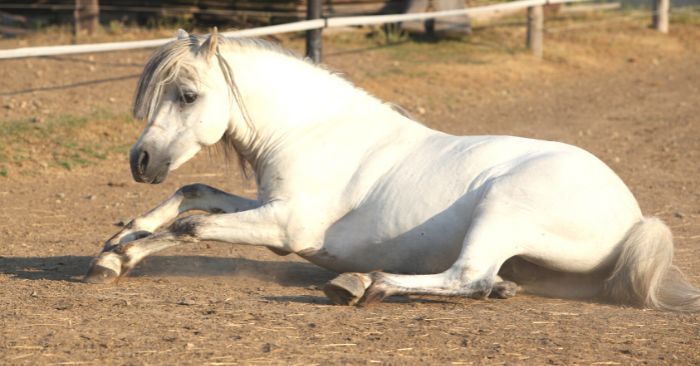7 Easy Ways To Help Prevent Equine Colic
Following are 7 easily implemented measures to decrease the risk of colic:

1) Feed Loose Salt to Avoid Dehydration
- Feed salt in supplements/grain to ensure consumption. Minimum dosage is 2 tablespoons per day for a 1,000 pound idle horse - you should provide additional salt depending on weather and loss from sweat. Verify sodium content in the current diet - some complete feeds and supplements may supply adequate sodium amounts.
- In addition, offer free choice loose salt or a white salt block. With only a salt block, your horse may not be able to consume its minimum salt requirements.
Correct sodium balance in the horse is necessary for proper thirst response and body water equilibrium (electrolytes and hydration). The vast majority of diets do not provide sufficient sodium without supplementation. This can greatly reduce the risk of impaction colic due to dehydration.
2) Practice Parasite Control
Cecal impaction from tapeworms, or damage to the blood supply of the intestines from chronic infestation of parasites, are causes of colic. Note: Fecal flotation tests are not an accurate method to determine accurate parasite burdens.
3) Provide Free Choice Forage - Avoid Confinement
Optimal digestion and fermentation requires consistent ingestion and movement (avoid confinement).Mobility stimulates gut motility. Trickle feeding throughout the day and night promotes consistent fermentation and a healthy population of beneficial bacteria, effectively keeping the hindgut weighted (to discourage twisting and encourage continued travel of undigested material motile). Muscles responsible for movement of the gut are better toned when utilized and can atrophy.Feeding meals of hay - which horses can consume too quickly - results in large amounts of dry matter lacking sufficient saliva to forage ratio - combined with large particle sizes from not properly masticating indigestible fiber. Consider slow feeders to increase chew time and further reduction of particle size. Chewing increases saliva production which provides moisture and aids in digestion. Always introduce new forages gradually to avoid disruption of the intestinal flora.
If you are concerned about caloric intake, offer tested low sugar/starch straight grass hay (NSC 10% or less), a well-balanced diet and routine exercise. Experiment with slow feeders to determine the smallest mesh size that enables your horse to extract hay without being frustrated. Frustration is counterproductive - it causes stress!
Did you know sand colic is estimated to be responsible for approximately 30% of colic cases? Learn the most effective means for sand removal and the best way to prevent the accumulation of sand.
4) Feed from Ground Level
A natural grazing position allows the mandible (jaw bone) to come down and forward in the atlantoaxial and temporomandibular joints. This enables the mandible to move freely up and down, side to side, forward and back without any restriction. This free movement facilitates natural wear of teeth along with optimum mastication and reduction of particle size.5) Perform Routine Dental Exams
Include exams at all ages for retained caps, lost and/or broken teeth, abnormal or uneven bite planes, infected teeth and/or gums, periodontal disease and hooks - which are sharp protrusions of teeth that can penetrate the opposing gum.Any condition causing pain can discourage the required chew time necessary for proper digestion - and may induce colic and/or choke. Optimal mastication (grinding) requires significant unobstructed motion of the jaw.
Miniature breeds are especially susceptible to genetic deformities. They have the same number of teeth, but whether they all fit in the reduced head size and line up properly is of concern. Find more suggestions for minis here: Feeding Miniature Horses & Donkeys: Why Slow Fed Forage is Best
6) Ensure Fresh Clean Water is Available at all Times
Buckets and tubs should be cleaned and changed daily. In colder climates, heat the water to at least 45 degrees Fahrenheit. The quality of your horse’s water should be equivalent to that of a human!7) Avoid Feeding Hay Pellets, Cubes or Chopped Hay as a Primary Forage Source
The already reduced particle size does not provide the volume of indigestible fiber to properly keep the gut motile and weighted.Hay provides the largest volume of fiber overall compared to hay pellets, cubes and chopped hay due to its natural particle size (longer leaves and stems) and requires longer chew time per pound. Chewing increases saliva production (an alkaline substance), which buffers gastric acid, aids in digestion and increases the saliva to forage ratio.
In addition, the digestive tract depends on a steady flow of fiber to:
- Maintain a healthy microbial population
- Promote gut motility
The quality of hay (including mold and noxious weeds) is not visible after the processing of pellets, cubes and chopped forage occurs. Of course, there are exceptions for individuals not able to masticate proficiently (typically older horses) due to dental challenges. If feeding pellets or cubes, soaking them prior to feeding is recommended. Learn more about Grass Hay vs Pellets, Cubes & Chopped Hay – Pros & Cons.
The Takeaway:
Being proactive to reduce or eliminate the occurrence of colic is far more productive than being reactive. Eliminating probable causes means far less mental and financial stress for you and less physical distress for your horse.Helpful How-to Resources for Slow Feeding
- Sand Colic - The Surprising (Simple) Cure & Prevention
- Beyond Low Sugar/Starch - Choosing Hay for Weight Management
- Slow Feeding - Transition Tips & Techniques
- Horse Slow Feeder Safety Tips
- Healthy Gradual Weight Loss for Horses vs. Fasting & Forage Restriction
- How to Introduce & Incorporate Free-Choice Forage: A Detailed Action Plan
- Slow Feed Solutions for Any Environment
- 6 Great Reasons to Feed Your Horse from Ground Level
- 7 Slow Feed Dos and Dont's for Horses
- Never Exercise Horses on an Empty Stomach...Ever
- Why You Shouldn't Transport Horses On An Empty Stomach
- Why Most Horse Prefer to Eat Outside
- Pagan, J. (2012 March 1) Feeding Management of Athletic Horses in Stressful Conditions. Retrieved from https://ker.com/equinews/feeding-management-athletic-horses-stressful-conditions/
- [i]Nathaniel A. White II DVM, MS, Diplomate ACVS , Prevalence, Demographics, and Risk Factors for Colic, retrieved from: https://www.vetmed.vt.edu/emc/welcome/bios/white/epidemiology_of_colic.pdf





2 Comments -
Hay Pillow Inc • -
Jennifer Jones •
Hi Jennifer,
In response to “he’s been neglected and hungry, and he pins his ears and gets very upset even if he’s not hungry”. Pain is often a source of crankiness (feet, back, ulcers, etc.). Determining the cause will help you determine a solution!
“He has that bloated belly look often too” see our blog post: Frequently Overlooked Causes of Hay Belly in Horses & Solutions.
He’s fortunate to have you as his guardian.
I love this information you freely give. I too free feed, and it is so nice to have horses not neighing and pawing in hunger. I am looking for advice on what do you do when you add a new horse,( I keep just two) and he’s been neglected and hungry, and he pins his ears and gets very upset even if he’s not hungry. He also has an underbite (lower jaw is longer than upper). He has that bloated belly look often too. He’s been here 6 months, he is an Andalusian and was a “dancing horse” ( I have a lot to say about that but not here) Thank you
Jennifer